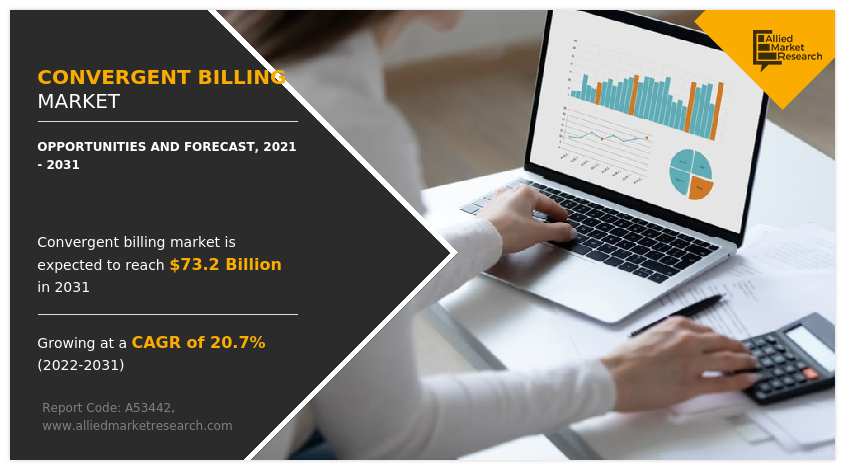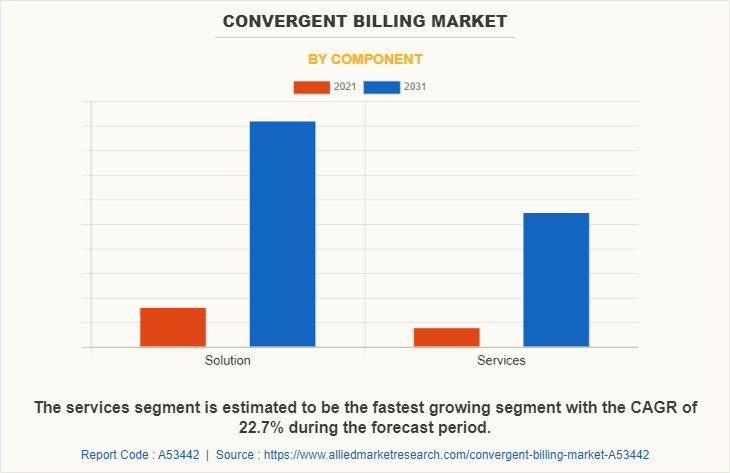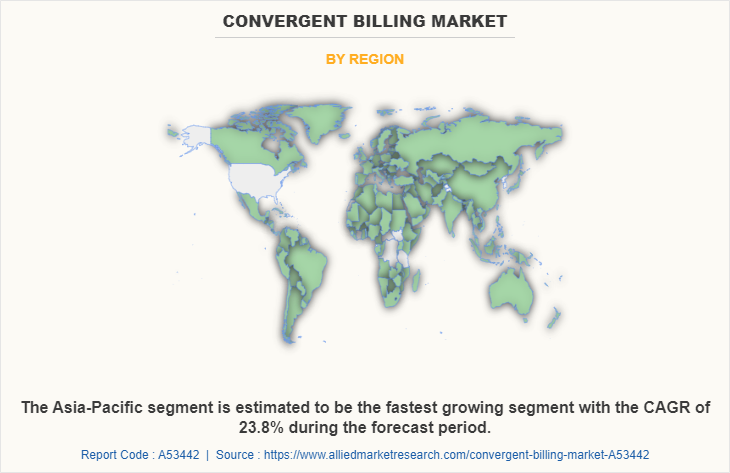Convergent Billing Market Overview
The global convergent billing market size was valued at USD 11.5 billion in 2021 and is projected to reach USD 73.2 billion by 2031, growing at a CAGR of 20.7% from 2022 to 2031.
A convergent billing is the integration of all service charges onto a single customer invoice and a unified view of the customer. Customer should call a call center and should get complete account information for all the services opted. Customer receives a single bill and makes a single payment for all the services. A truly convergent billing system should be able to consolidate any number and combination of products and services onto a single bill, regardless of the type of product and market segment. Moreover, telecom operators and organizations around the world have developed numerous billings solutions and techniques over the years to facilitate customers as well as for the progression of the telecommunication industry. Furthermore, it is an ongoing industry that keeps inventing new mechanics for its improvement.

One of the major advantages is the availability of an individual itemized billing of a customer. It provides an overview of outgoing calls that in the end benefits both the user and the firm. Most telecom firms have a large number of accounts to handle. It often leads to data complication and countless errors. The advent of convergent billing solutions reduces the risk of errors. It also benefits users who might want to save themselves from errors that had nothing to do with human error but resulted because of transactional value in the first place. Another leading advantage of convergent billing is its pre-identified model that improves customer service. Customer service executives are always aware of the queries that their customers pose which ultimately helps maintain customer loyalty and satisfaction. Further, many telecom firms are also inclined to change their tariff policies on their services quite regularly. This usually happens largely to incorporate new tariff changes in the billing process. The entire process helps customers and firms in smooth updated transitioning. Thus, creates lucrative growth opportunities in the market during the forecast period.
Factor such as increase in digital transformation initiative due to COVID-19 outbreak and increase in adoption of convergent billing solution to enhance operation & productivity, positively impact the growth of the market. Furthermore, increase in investment in advanced technology such as AI, IoT and big data is expected to provide the lucrative growth opportunities for the market in the upcoming years. However, data security & privacy concerns hamper the market growth.
Segment Review
The convergent billing market is segmented into component, deployment mode, enterprise size and region. By component, it is bifurcated into solution and services. By deployment mode, it is divided into on-premise and cloud. By enterprise size, the market is segregated into large enterprises and small and medium-sized enterprises. Region wise, it is analyzed across North America, Europe, Asia-Pacific, and LAMEA.

Depending on component, the solution segment dominated the convergent billing market size in 2021 and is expected to continue this trend during the forecast period. This is due to technological advancements that enable convergent billing to transform industries. However, the services segment is projected to hold the highest market share in the upcoming year. The adoption of convergent billing services enhances software implementation, maximizes the value of existing installation by optimizing it, and minimizes the deployment cost & risks, and others.

By region, North America dominated the convergent billing market share in 2021. The rising adoption of convergent billing solution to improve businesses and the customer experiences are expected to propel the market growth in this region. However, Asia-Pacific is expected to exhibit highest growth during the forecast period. This is attributed to increase the penetration of digitalization and higher adoption of cloud based solution & services, that boost the convergent billing market growth in this region.
Top Impacting Factors
Increase in digitalization due to COVID-19 outbreak
The outbreak of the COVID-19 pandemic has brought in stay-at-home measures, minimalist business scenarios, limited mobility, and early signs of a looming recession around the globe along with the volatile, complex, uncertain, and ambiguous situations for business operation. Thus, companies are accelerating their digital transformation strategies and adding convergent billing solution use cases in their daily activities as they are trying to stay afloat in an increasingly competitive market. Telecom businesses are paying attention to digital technology investments, due to rise in need to address the mass fallout from COVID-19. On the other hand, during the pandemic, market players are helping organizations in different industries to help them in digital transformation and to improve their management capabilities. Such progressively initiative helps in businesses in their digital transformation journey during the pandemic, thus fueling the convergent billing industry growth.
Increasing adoption of cloud-based solutions & services:
Mostly organizations are increasingly adopting cloud-based models by distributing their resources across environments. Cloud-based convergent billing solution has gained popularity as it provides flexibility, scalability, and low-cost benefits. It also helps organizations centrally analyze data generated from various locations and collect data from different software or platform, making it easy to gather and analyze data. Furthermore, convergent billing providers such as IBM Corporation, Nokia Corporation and Optiva Inc. have launched convergent billing offerings to cater to the business demand for across region, owing to transition to cloud. The major factors that boost the growth, include rise in need for improving the productivity of the organization by deploying advanced technology to meet the business needs. This fuels the convergent billing market forecast.
COVID-19 Impact Analysis
The current estimation of 2031 is projected to be higher than pre-COVID-19 estimates. The global COVID-19 pandemic has drastically affected businesses across the world. It has positively impacted the adoption of convergent billing market. Furthermore, businesses are investing more money on convergent billing due to the growing trend of personalized business operation as a way to enhance the customer experience. In addition, the solution offers firms a number of benefits, including the ability to control budget and help to enhance financial revenue management. Furthermore, growth in migration of businesses toward cloud and digital transformation initiative across countries is expected to create opportunities for the convergent billing market in the upcoming year.
Moreover, the pandemic has introduced considerable challenges for companies, which are trying to execute key processes, report accurately with data spread over multiple locations, and operate complex systems. Hence, a greater number of companies are investing in convergent billing solution. Convergent billing solution provides limitless scalability and continual enhancement of functionalities, which are critical in accomplishing digital transformation, thus boosting growth of the market post pandemic.
For instance, Intec Telecom Systems and IBM have completed a performance benchmark of Intec Convergent Billing v6, the latest version of its market leading customer care and billing system, on IBM System p5 servers, demonstrating the capability to handle a sustained throughput equivalent to the needs of a customer base of 60 million pre-paid subscribers. The benchmark was based on current customer implementation and reflected realistic operating conditions and data. Intec Convergent Billing v6 is designed to offer scalable, leading-edge performance for any combination of payment method and communications technology, including pre and post-paid, fixed, wireless, and next-generation services, for operators and service providers of all types and sizes. Such enhancement provide the lucrative opportunities for the convergent billing market trends during the forecast period.
Key Strategy/Development:
For instance, in September 2022, Optiva Inc., announced the launch of the first 5G telecom charging solution to be transacted through Google Cloud Marketplace. Optiva Charging Engine is pre-integrated with Google Cloud, enabling CSPs to rapidly procure the software and subsequently connect to other parts of their architecture within ninety days.
For instance, in May 2022, Ericsson and Orange France have signed a five-year agreement which will make Ericsson Charging the strategic monetization platform for Orange France’s 5G subscribers. Orange France is the largest French telecom operator.
For instance, in September 2021, Nokia launched a charging configurator microservice for its existing Nokia Converged Charging (NCC) monetization solution, enabling Communications Service Providers (CSPs) to create new charging logic and service offers and move faster to market when configuring new and innovative 5G services.
For instance, in December 2020, CSG International increased its billing deal with Airtel Africa to provide managed services, including convergent pricing, billing solutions, and customer relationship management, in order to improve its position throughout its 14-country presence in Africa.
Key Benefits for Stakeholders
The study provides an in-depth convergent billing market analysis along with the current trends and future estimations to elucidate the imminent investment pockets.
Information about key drivers, restrains, and opportunities and their impact analysis on the convergent billing market size is provided in the report.
The Porter’s five forces analysis illustrates the potency of buyers and suppliers operating in the convergent billing industry.
The quantitative analysis of the global convergent billing market for the period 2021–2031 is provided to determine the convergent billing market potential.
Convergent Billing Market Report Highlights
| Aspects | Details |
| Market Size By 2031 | USD 73.2 billion |
| Growth Rate | CAGR of 20.7% |
| Forecast period | 2021 - 2031 |
| Report Pages | 403 |
| By Component |
|
| By Deployment Mode |
|
| By Enterprise Size |
|
| By Region |
|
| Key Market Players | Amdocs, IBM Corporation, Huawei Technologies Co., Ltd., Optiva Inc., Nokia Corporation, CSG Systems International, Inc., Comarch SA, Oracle Corporation, sterlite technologies limited, Telefonaktiebolaget LM Ericsson |
Analyst Review
The adoption of convergent billing has increased over the period to provide reliable and consistent experiences for their subscribers. In addition, the ability of convergent billing to provide various opportunities for businesses to gain new insights to run the business efficiently is increasing its popularity among end users. Furthermore, businesses are investing in convergent billing to increase security and reduce expenses in organizations, which in turn fuels the growth of the market.
Furthermore, increased usage of internet-based services along with cloud computing services among organizations have significantly fueled the demand for market across the world. The presence of a large number of providers in the global convergent billing market increases the competitive rivalry among the key players. Therefore, convergent billing providers are differentiating themselves from competitors and driving revenue growth by incorporating new digital business technologies such as 5G networks their offerings to gain a competitive edge, and retain their market position.
The market is considerably concentrated with major players consuming significant market share. The degree of concentration will remain the same during the forecast period. The vendors operating in the market are taking several initiatives such as new product launches and partnership to stay competitive in the market and to strengthen their foothold in the market. For instance, ZSmart launched the Convergent Billing System (cvBS), which is a cloud-native compact BSS solution to provide end-to-end support to the mobile business of CSPs. This best-of-suite solution is designed with a unified data model, centralized product catalog, a converged charging engine and unified API management for all networks, services, channels and payment methods, which can navigate CSPs through the digital transformation quickly with a low cost and in the meantime deliver the best-in-class customer experience. Such enhancement is opportunistic for the market growth.
Global Convergent Billing Market is Expected to Reach $ 73,153.92 Million by 2031.
Factors such as increase in digital transformation initiative due to COVID-19 outbreak and increase in adoption of convergent billing solution to enhance operation & productivity, positively impact the growth of the market
The North America is the largest market for the Convergent Billing.
The key growth strategies for Convergent Billing include product launch, acquisition, partnership, collaboration and others.
Amdocs, CSG Systems International, Inc., Huawei Technologies Co., Ltd., IBM Corporation, Nokia Corporation, Optiva Inc., Oracle Corporation, Comarch SA, Sterlite Technologies Limited and Telefonaktiebolaget LM Ericsson, are some top companies.
Loading Table Of Content...



